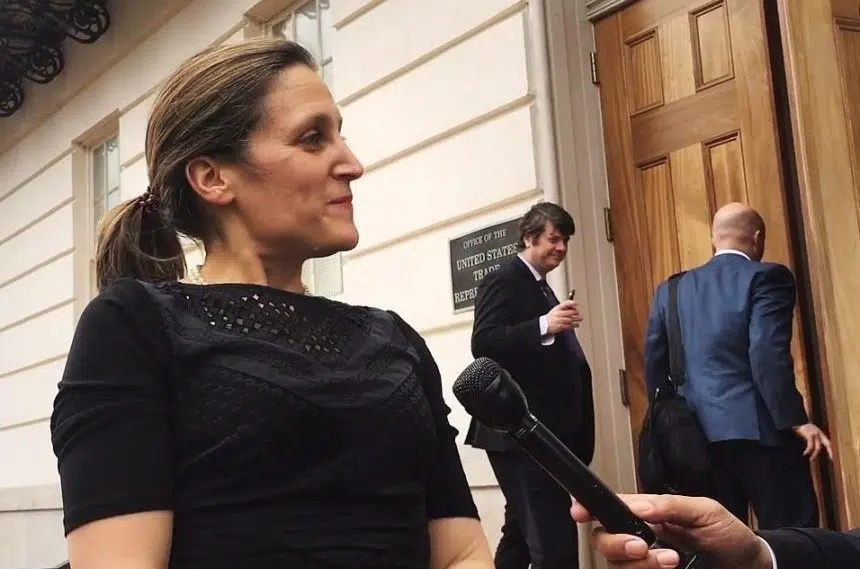WASHINGTON — Negotiations have entered an around-the-clock phase in an effort to get a new NAFTA agreement within days, with top political staff converging in Washington for meetings stretching into the night Tuesday and beyond.
Top officials in the office of Prime Minister Justin Trudeau flew down to join Foreign Affairs Minister Chrystia Freeland for talks at the U.S. trade building, and President Donald Trump’s son-in-law Jared Kushner also made an appearance.
After a three-hour meeting with her U.S. counterpart Robert Lighthizer, Freeland emerged to announce that she was remaining in Washington for at least another day.
“At this point everyone is working 24-7,” Freeland told reporters. “It’s about sending each other proposals and being ready to respond to them … We are going to be working hard late into the night based on some of the points that were raised today.
“We’ll be back at it tomorrow.”
The source of this flurry of activity is the political calendar, with a confluence of events about to hit: a legislative deadline next month for the current Republican-led Congress to vote on the deal, the Mexican presidential elections, a short-staffed U.S. trade team trying to shift its focus to Asia — and fresh news that Lighthizer is being sent to China for talks next week.
Four people briefed on the NAFTA developments said they see a deal being possible as early as this week, based on a variety of factors. For one thing, the talks are drawing the political heavy-hitters of each country.
Trudeau’s chief of staff Katie Telford and his director of U.S. affairs Brian Clow are at the talks, as are the U.S. and Canadian ambassadors to each country, Kushner, and top Mexican minister Luis Videgaray — all making rare appearances alongside the ministers leading the NAFTA file.
One industry stakeholder said: “The negotiation has been elevated to the political level.”
Trump himself said an agreement could come soon. “We’re doing very nicely with NAFTA. I can make a deal very quickly,” Trump said Tuesday, though he added that he wasn’t sure.
Canada’s official position is that there is no deadline pressure.
In fact, Freeland made a point of alluding to ongoing irritants, after repeating her oft-stated view that autos would be the key to a new deal: “There are other issues that still need to be resolved,” she said.
But she repeated that autos remained the main focus at the table.
According to sources familiar with the autos negotiations, a new agreement would adopt a Buy North American approach to steel in autos, with a requirement that high-value parts consist mainly of steel from this continent. One source pegged the steel requirement at 70 per cent.
In addition, the new rules would significantly ramp up the North American content requirement for all other parts, from the current 62.5 per cent of a car to 75 per cent.
Rules for individual pieces would change, with a focus on keeping high-value manufacturing on this continent.
Items like engines and batteries would have to be 75 per cent North American; the standard for mid-value parts like the electronics in seats would be 70 per cent; and it would be 65 per cent for cheaper products like seat-belts.
Now, says Flavio Volpe, head of the Canadian Automotive Parts Manufacturers Association, the challenge is getting the fine print crafted properly so that there is no accidental damage to the industry.
He said a particular concern is the number of years it will take to phase in the new rules. The U.S. has been proposing a two-year transition, but Volpe said auto investments are already locked in a few years in advance as companies work on five-to-seven-year planning cycles.
He said companies could simply ignore the NAFTA rules and pay the tariff if they find the rules impossible to meet. He added that there aren’t any idle North American plants to which production could be immediately shifted.
“If you make it happen quickly, it won’t happen,” Volpe said of the changes.
“They’ll have to break contracts with current suppliers (if it’s done too quickly), pay for the moving (of supply chains) … and compensate now-former suppliers.”
Freeland said her team is indeed sifting through the finer details on autos.
“We are the diligent, do-your-homework, fact-based country,” she told reporters, describing the auto talks. “We’re very, very focused right now on digging into some of the details, making sure there are no unintended consequences — being sure we get things right.”
Alexander Panetta, The Canadian Press







